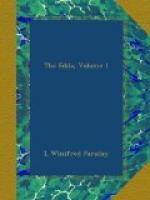Ragnaroek.—The Twilight of the Gods (or Doom of the Gods) is the central point of the Viking religion. The Regin (of which Ragna is genitive plural) are the ruling powers, often called Ginnregin (the great Gods), Uppregin (the high Gods), Thrymregin (the warrior Gods). The word is commonly used of the Aesir in Voeluspa; in Alvissmal the Regin seem to be distinguished from both Aesir and Vanir. The whole story of the Aesir is overshadowed by knowledge of this coming doom, the time when they shall meet foes more terrible than the giants, and fall before them; their constant effort is to learn what will happen then, and to gather their forces together to meet it. The coming Ragnaroek is the reason for the existence of Valhalla with its hosts of slain warriors; and of all the Gods, Odin, Thor, Tyr and Loki are most closely connected with it. Two poems of the verse Edda describe it:
(1) Vafthrudnismal:
V. “What is the plain called where Surt and the blessed Gods shall meet in battle?”
O. “Vigrid is the name of the place where Surt and the blessed Gods shall meet in battle. It is a hundred miles every way; it is their destined battle-field.”
* * * * *
O. “Whence shall the sun come on the smooth heaven when Fenri has destroyed this one?”
V. “Before Fenri destroy her, the elf-beam shall bear a daughter: that maid shall ride along her mother’s paths, when the Gods perish.”
O. “Which of the Aesir shall rule over the realms of the Gods, when Surt’s fire is quenched?”
V. “Vidar and Vali shall dwell in the sanctuary of the Gods when Surt’s fire is quenched. Modi and Magni shall have Mjoellni at the end of Vingni’s (i.e., Thor’s) combat.”
O. “What shall be Odin’s end, when the Gods perish?”
V. “The Wolf will swallow the father of men; Vidar will avenge it. He will cleave the Wolf’s cold jaws in the battle.”
(2) Voeluspa:
“A hag sits eastward in Ironwood and rears Fenri’s children; one of them all, in troll’s shape, shall be the sun’s destroyer. He shall feed on the lives of death-doomed men; with red blood he shall redden the seat of the Gods. The sunshine shall grow black, all winds will be unfriendly in the after-summers.... I see further in the future the great Ragnaroek of the Gods of Victory.... Heimdal blows loudly, the horn is on high; Yggdrasil’s ash trembles as it stands, the old tree groans.”
The following lines tell of the fire-giants and the various combats, and the last section of the poem deals with a new world when Baldr, Hoed and Hoeni are to come back to the dwelling-place of the Gods.
The whole points to a belief in the early destruction of the world and the passing away of the old order of things. Whether the new world which Vafthrudnismal and Voeluspa both prophesy belongs to the original idea or not is a disputed point. Probably it does not; at all events, none of the old Aesir, according to the poems, are to survive, for Modi and Magni are not really Gods at all, Baldr, Hoed and Vali belong to another myth, Hoeni had passed out of the hierarchy by his exchange with Njoerd, and Vidar’s origin is obscure.




